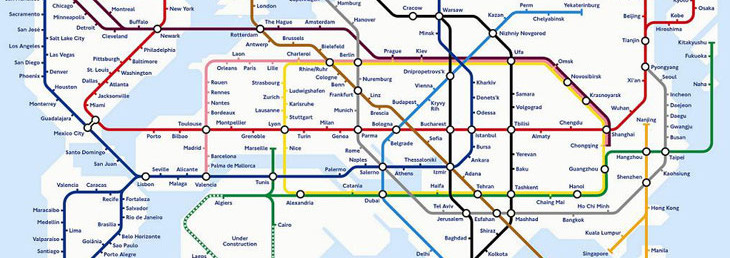More collaborative cities raise while less collaborative nations stall

Cities are the scene for most of the world challenges of our time. No wonder. For start, they are home to more than half of the world’s population, a proportion that will increase during next years. Cities are, for instance, the source of 70% of the world’s greenhouse gases, and the most likely place where to suffer the consequences of perils such as natural resources scarcity, poverty or crime and terrorism.
But cities are also the most efficient government body to solve these challenges. As it happened for centuries, cities continue to be the major incubators of political, social and cultural innovation. Cities not just become the best real-life laboratories to test new policies. City councils suppose currently and increasingly the most direct formal contact between government and those governed.
Cities role as problem solvers is rising while other government bodies as nation states are increasingly being considered obsolete or dysfunctional. Several facts could explain this trend. We think any elucidation about the reasons why should include as a key element cities presenting a greater goodwill, more appropriate configuration and better mindset for collaboration than national governments.
A style of government that easies collaboration
Several studies have shown that municipal leaders tend to be more resourceful problem solvers. A logical outcome, considering cities must cope with the day to day realities. Mayors and councils find themselves more obliged to deliver services rapidly and effectively. They are often also more able to test and refine possible approaches faster than national governments.
But more importantly, local executives usually exhibit a less partisan and more pragmatic style of governance. As former New York mayor Fiorello La Guardia once said “There is no Democratic or Republican way of fixing a sewer.” It’s a particular manner of trying to do things that is more difficult to find on the halls of power when at national level.
Cities usually show a quality of leadership that easies collaboration. Think for instance about the apparently less difficulties different political parties seem to have when trying to form a municipal government compared with the more frequent blocking stances when government formation is at national level. Or remember the often apparent uselessness of organizations as United Nations to advance at any level when trying to stop international conflicts or global challenges, or the difficulties for European Union to become a real union of nations compared with the increasing number of global networks of cities established to tackle specific issues.
The network model fosters collaboration
Cooperating by sharing assets and experiences, these international networks are in general demonstrating a much greater level of success, unburdened with the issues of borders and sovereignty which hobble the capacity of nation-states to work with one another. Working as a networks, city leaders and managers cannot replicate their municipal or national governance model in which the number of votes you hold on your side makes your point of view prevalent. At the contrary, by coming together through the network model in which collaboration is paramount, in order to make a real difference for the world’s toughest challenges these leaders have no other option that to agree on strategic objectives and identify common solutions.
Some examples of these kind of collaborative networks between cities are C40, a coalition of municipalities whose members are reported to have taken more than 10,000 concrete actions to reduce greenhouse-gas emissions; or 100 Resilient Cities, an organization pioneered by the Rockefeller Foundation and dedicated to help cities around the world to become more resilient to the physical, social and economic current global challenges. It is significant that judges in charge of approving applications from prospective cities to become members of this organization look for not just innovative mayors but also a history of building partnerships and an ability to work with a wide range of stakeholders.
One of the most recent and also perhaps one of the most interesting of such collaborative networks is The Global Parliament of Mayors (GPM), deriving from the ideas of Benjamin Barber, author of the book ‘If mayors ruled the world’, who asserts that cities, and the mayors that run them, offer the best new forces of good governance and best practices to support and accelerate global answers in an ever interdependent world.
